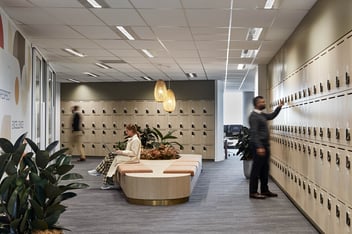
The Future of Work: Embracing Flexible Work Arrangements

Discover how flexible work arrangements are shaping the future of work and why embracing them is crucial for businesses and employees alike.
Embracing the Evolution of the Workplace
The workplace is constantly evolving, and one of the significant changes we are witnessing is the rise of flexible work arrangements. Gone are the days when employees had to be physically present in the office from 9 to 5. With the advancements in technology and the changing needs of employees, companies are now embracing flexible work arrangements to attract and retain top talent.
Flexible work arrangements encompass various options such as remote work, flextime, compressed workweeks, and job sharing. This evolution of the workplace allows employees to have more control over their work-life balance and increases their overall job satisfaction. By embracing this change, companies can create a more inclusive and accommodating work environment.
Benefits of Flexible Work Arrangements
Flexible work arrangements offer numerous benefits for both businesses and employees. For businesses, it allows them to tap into a global talent pool without being limited by geographical boundaries. This opens up opportunities for diverse perspectives and ideas, leading to increased innovation and creativity.
Additionally, flexible work arrangements can result in higher employee productivity. When employees have the flexibility to work when and where they are most productive, they can better manage their time and focus on delivering high-quality work. This increased productivity can positively impact the company's bottom line.
For employees, flexible work arrangements provide a better work-life balance. They can avoid long commutes and have more time for personal commitments, leading to reduced stress and improved mental well-being. It also allows individuals with caregiving responsibilities to better manage their work and family responsibilities.
Moreover, flexible work arrangements promote diversity and inclusion by accommodating the needs of individuals with neurodiversity or health conditions. It creates equal opportunities for everyone to contribute and thrive in the workplace.
Challenges and Solutions for Remote Work
While remote work offers flexibility and freedom, it also comes with its own set of challenges. One of the primary challenges is maintaining effective communication and collaboration among remote teams. Without face-to-face interactions, it is crucial to leverage technology tools and platforms to foster virtual collaboration and maintain strong team connections.
Another challenge is ensuring work-life balance. Remote work can blur the boundaries between work and personal life, leading to longer working hours and potential burnout. It is essential for individuals and companies to establish clear boundaries and prioritise self-care to maintain a healthy work-life balance. The World Economic Forum has identified that women remote workers are at a higher risk of burnout and can be overlooked for career advancement.
To overcome these challenges, companies can implement solutions such as hybrid working and virtual team-building activities to foster a sense of belonging and connection. They can also provide resources and support for employees to manage their well-being and establish healthy work routines.
The Role of Technology in Enabling Flexible Work
The right flexible working technology empowers organisations to create seamless digital experiences that keep employees connected, productive, and secure, no matter where they work.
Technology plays a vital role in enabling flexible work arrangements. It provides the tools and infrastructure necessary for seamless remote work and virtual collaboration. Cloud-based platforms, project management tools, video conferencing software, and instant messaging apps are just a few examples of technologies that facilitate flexible work.
Furthermore, advancements in artificial intelligence and automation can streamline repetitive tasks, allowing employees to focus on more value-added work. This integration of technology in the workplace not only enables flexibility but also enhances efficiency and productivity.
It is crucial for companies to invest in reliable and secure technology solutions to support flexible work arrangements and ensure data privacy and cybersecurity.
Tips for Successfully Implementing Flexible Work Arrangements
Implementing flexible work arrangements requires a careful workplace strategy and execution. Here are some tips to ensure its successful implementation:
1. Clearly define expectations and guidelines: Establish clear guidelines regarding work hours, communication protocols, and performance expectations. This clarity helps avoid misunderstandings and ensures everyone is on the same page.
2. Provide necessary resources and technology: Ensure that employees have access to the required technology and resources to effectively carry out their work remotely. This may include providing laptops, secure network connections, and collaboration tools.
3. Foster a culture of trust and accountability: Trust is the foundation of successful remote work. Encourage open communication, provide regular feedback, and focus on outcomes rather than micromanaging. This creates a sense of autonomy and accountability among employees.
4. Offer training and support: Provide training sessions and resources to help employees navigate remote work challenges, utilise technology effectively, and maintain work-life balance. Support from managers and HR is crucial in addressing any concerns or difficulties.
5. Continuously evaluate and adapt: Regularly assess the effectiveness of flexible work arrangements and make necessary adjustments. Encourage feedback from employees and make improvements based on their input.
Understanding how to lead flexible teams effectively is essential for building trust, maintaining accountability, and ensuring long-term success in a hybrid work environment.
By following these tips, companies can successfully implement flexible work arrangements and reap the benefits they offer.





